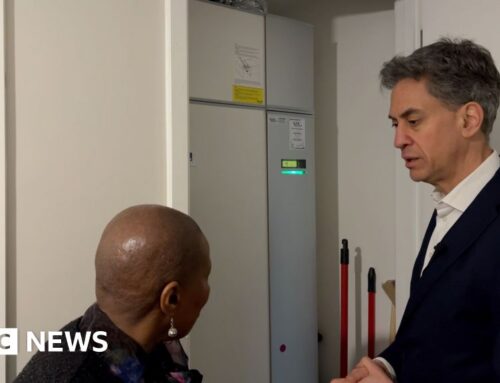War Is Peace, Gas Is Now “Clean Energy”
June 9, 2025
This piece is being co-published with ExxonKnews, a reporting project covering the fossil fuel industry and climate accountability.
A wave of bills in state legislatures across the country aim to classify climate-heating methane gas as a source of “green” or “clean” energy to prevent communities from transitioning away from fossil fuels — and secretive dark money groups connected to the gas industry are behind the effort.
The legislation could threaten the enforcement of climate policies across the country, allowing gas to stand in for clean energy in states’ renewable energy portfolios or otherwise thwarting local efforts to phase out reliance on fossil fuels. As methane emissions increasingly drive climate change, the bills would disguise the devastating environmental impacts of the powerful greenhouse gas — while the Trump administration caters to fossil fuel-backed donors on federal gas policy.
State officials say the bills are necessary to protect local economic development tied to a major local source of energy. But the legislators didn’t come up with the idea on their own: The rebrand originated from model legislation introduced by the American Legislative Exchange Council (ALEC), a conservative lobbying network funded by large corporations. And, in at least one case, the effort is being pushed by the gas industry itself to further entrench states’ dependence on gas.
ALEC has a reputation for providing pro-corporate model legislation to legislators, including many bills designed to obstruct climate action. In recent years, the group has drafted bills to blacklist companies that boycott the fossil fuel industry and criminalize protests of fossil fuel infrastructure.
While the group’s donors have largely been hidden from the public, its second-largest known donor is fossil fuel mogul Charles Koch, an investigation by the Center for Media and Democracy found.
A version of the methane gas rebranding bill first passed in Ohio in 2023 after it was floated by The Empowerment Alliance, a dark money gas advocacy group helmed by Trump megadonor and former gas industry executive couple Tom Rastin and Karen Buchwald Wright. According to documents obtained by the watchdog Energy and Policy Institute and first reported by the Washington Post, The Empowerment Alliance worked with Ohio state legislators on the idea, while ALEC provided a model bill and talking points for officials.
Preorder Your Copy Now.
Master Plan, a new book from The Lever, builds on the award-winning and chart-topping podcast series, uncovering the hidden history of how unrestrained money and influence have transformed the United States into a full-fledged kleptocracy.
Lever Leaders will receive a free copy as their 2025 Leader gift.
ALEC denied its involvement in Ohio’s law after the Washington Post published its story. But last summer, ALEC posted a markedly similar model bill on its website.
The model bill, titled “The Affordable, Reliable, and Clean Energy Security Act,” states that “‘Green energy’ will be redefined as meaning any energy generated by using an energy resource in which the emissions are equivalent to the standard set by pipeline-quality natural gas, (e.g. those emitted by residential gas stoves).’”
Since that model bill was published, a new swath of states — including Indiana, Tennessee, Mississippi, and Louisiana — have introduced similar legislation declaring gas a “clean” or “green” source of energy. Indiana and Tennessee’s bills passed into law in April. Mississippi’s bill died in committee in February. But Louisiana’s bill — whose first iteration included exact language from the ALEC model legislation — passed in the state’s House of Representatives on June 2 and is now being considered by its Senate.
The Empowerment Alliance promotes the proliferation of ALEC’s model bill on its website. “We define American natural gas as green and clean energy,” the site reads. “We encourage all 50 states to pass legislation using the ARC Energy Security model as a starting point to unleash energy prosperity for every household and business.” Other allied fossil fuel-funded think tanks, like the Heartland Institute and the Institute for Energy Research, have also backed the model legislation.
But clean energy advocates and experts say the bills are a clear attempt by the fossil fuel industry to preempt any local transition away from their products, which pose severe threats to local air quality and the climate.
“It’s simply a grand effort at greenwashing a dirty energy source,” said Gabe Filippelli, executive director of the Environmental Resilience Institute and professor of earth sciences at Indiana University.
Methane, the main component in “natural” gas, is more than 28 times as potent as carbon dioxide at trapping heat in the atmosphere, and more than 80 times as potent over the first two decades of its release. Methane emissions are rising faster than ever, even as technologies for documenting and monitoring leaks have advanced.
Yet despite knowing the risks it poses to the climate, major fossil fuel producers have campaigned to promote gas as a cleaner alternative to other fossil fuels, according to internal documents made public by Congress last year.
The legislation moving through statehouses across the country would take those industry campaigns a step further, using the rebranding of gas to facilitate the continued buildout and use of fossil fuels, even if new climate and clean energy requirements are introduced.
Sabotage, State By State
Twenty-nine states and D.C. have passed renewable portfolio standards, which require a certain portion of the state’s electricity to be met with renewable energy sources like wind and solar. Some states have clean electricity standards that allow state utilities to include nuclear and other forms of energy not typically defined as renewable as “clean” energy sources. Even in states without such standards, some municipal governments have passed or considered clean energy standards at the local level.
The new bills could drastically weaken those standards by forcing state and municipal governments to include methane gas — a fossil fuel — as a source of “clean” or “renewable” energy.
Tennessee, for example, passed a law clarifying that “a political subdivision that imposes requirements or expectations related to the type of clean or green, or renewable, energy used by a public utility in an ordinance, resolution, or other regulation must include certain sources of energy” — including gas. Effectively, the law could prevent municipalities in the state with renewable-energy requirements — like Nashville, which has committed to using 100 percent renewable energy by 2041 — from excluding gas in its efforts.
They can’t scam who they can’t find. Let Incogni get your personal information off the internet. Help protect yourself from identity theft, spam calls, and online threats impacting your physical safety. Get 55% off annual plans by using LEVER at the checkout.
Tennessee initially passed a less specific law defining gas as “clean energy” in 2023, shortly after Ohio’s. According to a leaked presentation and audio, the Tennessee Gas Association — the state’s industry trade association and lobbying group — took credit for passing that bill.
“We were able to pass a bill that classified natural gas as a clean energy,” said Jim Spears, then a lobbyist for the Tennessee Gas Association at the group’s annual meeting in Orlando that summer, suggesting that he and major fossil fuel executives in the state “all worked on it together.”
“Fossil fuels are under attack,” Spears continued. “It’s a nationwide issue… We have great relationships with the legislature. So that’s how we get bills passed that protect us.”
The Tennessee Valley Authority, the country’s largest public utility, is currently embarking on one of the largest gas expansions of any utility nationwide.
In Louisiana, the new bill redefining gas as green energy would go even further, declaring that the state’s Department of Energy and Natural Resources should work with the Public Service Commission to “use energy generated by hydrocarbons as a resource.” Hydrocarbons are strictly defined by Louisiana statute as being “oil and gas occurring naturally in the earth and any other valuable liquid or gaseous substance found and produced in association with them.”
According to Jackson Voss, the climate policy coordinator for the Louisiana advocacy group Alliance for Affordable Energy, the bill could be used to “preempt the development of renewables by giving political cover to our regulators” to allow the expansion of gas projects in the state.
Louisiana utilities are engaged in a public process to determine how they will meet the state’s energy demands. The state’s utilities will present their plans to the Louisiana Public Service Commission, where regulators take more campaign cash from power companies and fossil fuel interests than almost any other state.
A much narrower bill in Michigan, which is now before the state Senate, would designate two existing gas-fired power plants as clean energy. If enacted, the bill would allow the plants to continue running under the state’s energy laws, which set a standard for 100 percent clean energy by 2040 with some exceptions.
Indiana’s law — which also defines petroleum-based propane as a “clean energy,” a rebrand first promoted by the propane industry — opens gas and propane up to “any state or federal program that provides funds” originally intended for wind, solar, and other renewable energy projects.
The Empowerment Alliance celebrated Indiana’s bill in its “Common Sense” newsletter earlier this year, before it became law. “We encourage legislators in other states to examine what Ohio, Tennessee, and Indiana have done,” the newsletter reads. “Adopting a Natural Gas is Green law will lead to a clean, green, energy future.”
The Empowerment Alliance, ALEC, and the Tennessee Gas Association did not respond to requests for comment.
Kill Renewables, Unleash Gas
The methane gas rebranding appears to be one of many tactics in a yearslong industry backlash against local actions to address climate emissions from gas and calls for stricter environmental, social, and governance (ESG) practices.
At a 2019 executive committee meeting of the American Gas Association, the gas lobbying and utility trade group presented a strategy for gas companies, local trade associations, and pro-gas groups and campaigns — including The Empowerment Alliance — to block state-level public policy initiatives to ban new gas infrastructure and use in homes and buildings.
One of the lobbying group’s major 2020 priorities would be to “intensif[y] our efforts at the state and local levels on a variety of tracks in order to ensure consumers have energy choices that include clean, affordable natural gas,” according to minutes from the meeting obtained by the Energy and Policy Institute.
The move to codify gas as clean coincides with other state and federal efforts to undermine renewable energy projects while removing restrictions on the fossil fuel industry.
In Ohio, Tom Rastin, who leads The Empowerment Alliance and was until recently an executive of Ariel Corporation, one of the world’s biggest manufacturers of methane gas compressors, worked with Ohio legislators to pass its legislation labeling gas as “green.”
Rastin is also a powerful figure behind a local anti-renewable crusade in the state. According to reporting by ProPublica and Floodlight, Rastin is a major funder of Knox Smart Development — an anti-solar energy group that brands itself as a grassroots advocate — which helped provoke opposition to a large Ohio solar project. The group ran anti-solar ads in a pay-to-play “local newspaper” run by Metric Media, a Koch-linked network of partisan websites, which also featured a weekly column by The Empowerment Alliance promoting gas.
In Michigan, meanwhile, Rastin contributed $10,000 to Citizens for Local Choice, a ballot campaign that aimed to curb wind and solar projects.
The effort to block renewable development while unleashing fossil fuels is also coming from the Trump administration, which has made those policies a cornerstone of its agenda.
The federal government has rescinded nearly $4 billion in clean energy grants, attempted to “stop the enforcement” of state climate laws, and worked to kill pollution restrictions and long-standing emissions reporting requirements. The U.S. Interior Department is planning to fast-track permitting for oil and gas projects to a maximum of 28 days, and Trump has promised to revive “America’s beautiful clean coal industry.”
What’s more, Trump’s budget bill would repeal methane pollution limits under the Clean Air Act while allowing gas companies to purchase an expedited permitting process for a one-time $10 million fee, or pay $1 million to the Department of Energy to deem a gas import or export facility to be “in the public interest.”
The latest Yale Climate Opinion survey found that 66 percent of Americans support a transition from fossil fuels to clean energy by 2050. But advocates say state and federal debates over energy policy may reflect more about the fossil fuel industry’s influence than the desires of the public.
In Louisiana, Voss at the Alliance for Affordable Energy fears that industry is about to push through a gas greenwashing law that will not bode well for the state. Louisiana residents pay far higher electric bills than most of the country and have one of the least reliable grids.
More gas would “make our grid here in Louisiana even less reliable and certainly less affordable and more damaging to public health and the environment,” said Voss. “There really is no upside for anybody other than the corporate utilities, who are going to maximize profits to the extent that they can.”
Note: ExxonKnews is a reporting project of the Center for Climate Integrity (CCI), an advocacy group that provides research and tools to help communities hold oil and gas corporations accountable. CCI’s political staff submitted testimony in opposition to Michigan’s aforementioned bill, but had no role in producing this story.
Search
RECENT PRESS RELEASES
Related Post





